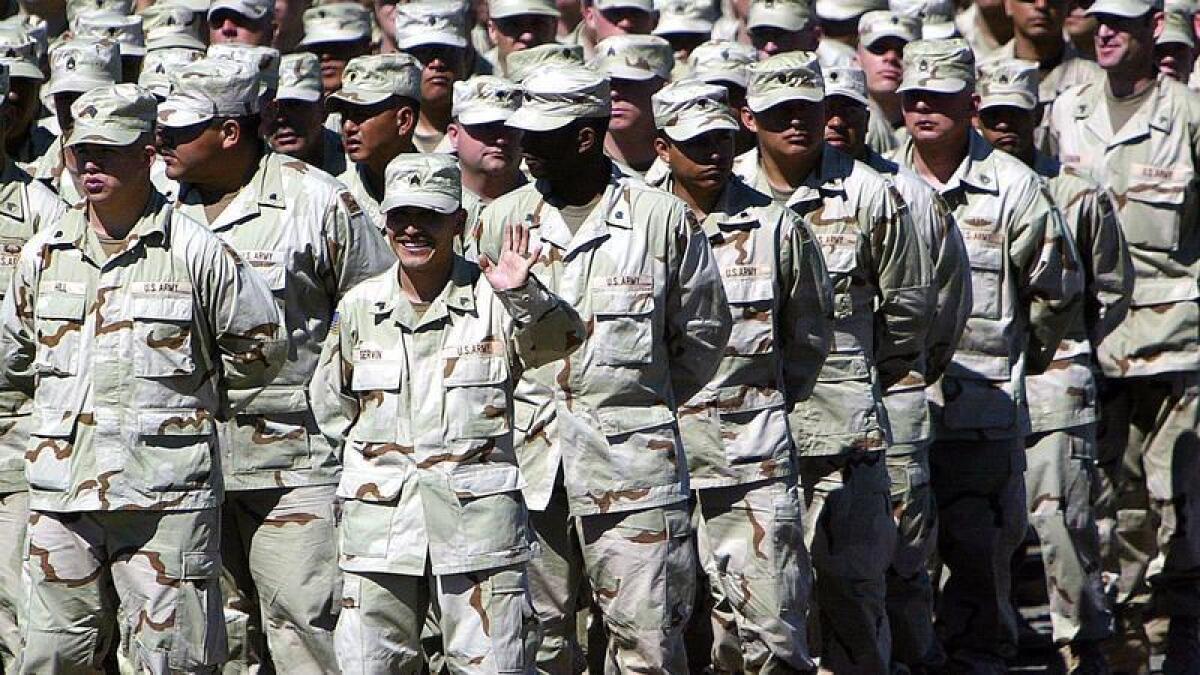Pentagon says it will waive bonus repayments for vast majority of California National Guard soldiers

- Share via
Reporting from Washington — The Pentagon said Tuesday it would waive repayment for more than 15,000 California National Guard soldiers and veterans who received enlistment bonuses over the last decade but that 1,000 or so other service members would not have their debts waived.
Peter Levine, the Pentagon’s top personnel official, told reporters that the Defense Department would begin notifying soldiers this month that their debts were being waived and that all of the notifications would be completed before July 1.
“We think that the number of cases in which we’ll be recouping will be a few hundred, as opposed to the many thousands of cases that are under the sword of Damocles right now,” Levine said.
Levine’s figures were higher than those the California Guard had provided in recent months, and suggest the problem was larger than previously recognized. California Guard officials had said they had audited 14,000 soldiers’ bonuses and that about 9,800 were facing repayment demands.
The announcement follows President Obama’s signing of a defense authorization bill into law on Dec. 23. The bill contained language that required the Pentagon to conduct a case-by-case review of the California Guard bonuses and to wave repayment unless a soldier took the money fraudulently or did not fulfill his or her enlistment contract.
The Times reported in October that the California Guard was using tax liens and other aggressive tactics to force about 9,700 soldiers and veterans to repay enlistment bonuses and other financial incentives awarded during the height of the wars in Iraq and Afghanistan.
Though some of the bonuses were awarded improperly, The Times found that many of the repayment demands resulted from the California Guard losing soldiers’ records or other administrative errors. Many of the soldiers who received the demands had served in combat, and some returned with severe injuries.
Many soldiers were told to repay bonuses of $15,000 or more, years after they had completed their military service. Student loan repayments, which were given to some soldiers with educational loans, sometimes totaled as much as $50,000.
In the most detailed accounting of the fiasco yet, Levine said that a Pentagon review had found a total of 17,500 bonuses were paid to California Guard soldiers from 2004 to 2010.
Of those, he said, 1,400 soldiers had been ordered to begin repaying a bonus or student loan incentive, while another 16,000 had been notified that they could face debt collection.
About half the 1,400 who have been repaying their bonuses are likely to have the debts waived and their money returned, Levine said.
About 1,000 or fewer of the remaining 16,000 will have to repay, he added.
In most cases, repayments will be from soldiers who decided not to fulfill their six-year enlistment terms or other terms of their contract, he said.
“Most of the cases in which we’ll be recouping, we will be recouping because the soldier didn’t fulfill their commitment,” Levine said. “There will be some cases in which we have fraud or evidence of fraud or knowledge or should have known.”
The cases will be reviewed by the Army Board for the Correction of Military Records.
National Guard soldiers in other states who have been ordered to repay bonuses are not eligible for the debt forgiveness that Congress approved for California.
Audits by the National Guard of Indiana, Missouri, Kentucky and Pennsylvania starting in 2011 looked at small samples of records and found that hundreds of soldiers received improper bonuses in two of the states. Internal checks in Texas found thousands of improper payments.
The Pentagon has not done a full-scale nationwide audit of National Guard bonus payments. But officials say reforms have been put in place to make it much harder for soldiers to receive bonuses for which they are not entitled.
Pentagon officials have said California was distinct in scale and because a handful of soldiers fraudulently took bonuses.
Explaining the decision to limit forgiveness to California soldiers, Levine said, “We’ve determined that there was no other state in which there was the kind of massive problem that there was in California.”
He said fiscal controls on bonuses were lax in other states as well, some of which also had just one person responsible for approving bonuses.
“Those internal control problems weren’t unique to California,” he said. “What we had in California was the vulnerability was systematically exploited. That’s why we had the problem there that we didn’t have elsewhere.”
Most of the improper bonuses in California were processed by Army Master Sgt. Toni Jaffe, the California Guard’s incentive manager, who pleaded guilty in 2011 to filing false claims of $15.2 million and was sentenced to 30 months in federal prison.
Jaffe was the sole official in the California Guard responsible for processing bonuses. She told The Times in an interview last month that she was overworked and under pressure to approve bonuses to meet recruiting goals.
Twitter: @davidcloudLAT
ALSO:
Thousands of California soldiers forced to repay enlistment bonuses a decade after going to war
Defense secretary orders Pentagon to stop seeking repayment of California National Guard bonuses
Congress proposals would let California National Guard soldiers keep millions in bonuses
More to Read
Sign up for Essential California
The most important California stories and recommendations in your inbox every morning.
You may occasionally receive promotional content from the Los Angeles Times.











